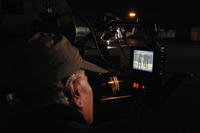All this talk about how the geostrategic future of the U.S. is in the Western Pacific, which means Washington should bet on the blue services? The Army's top leaders have heard it before. Army Chief of Staff. Gen Ray Odierno said he could remember serving as a one-star on the Army Staff and seeing all the briefings and white-papers about sea- and airpower as the keys to America's future. Then, he said, the U.S. went on to fight two prolonged land wars.
Odierno and Army Secretary John McHugh say they get it: The Army may have to shrink somewhat to keep pace with the reduced growth of DoD's forthcoming budgets. But the United States will always need a robust Army, they said, because for as fashionable as sea- and airpower might become, they'll never be able to hold territory without putting boots on the ground and "troops in the mud," in McHugh's phrase.
"The enemy gets a vote," he said. "We can dictate to ourselves how we are postured to fight, but we cannot dictate to them what war to fight ... We need an Army that is capable of doing whatever's necessary, and that is the Army we're building."
He had another line ready in a press conference with reporters: It was all good and well for American air forces to "shock and awe" Baghdad at the outset of the Iraq War -- "But after we shocked and awed, we had to march," he said. There'll always be a need for land power to walk through the door that the other forces may kick open -- though McHugh would also probably point out that the Army can do its fair share of kicking, too.
McHugh wound up his keynote address at the Association of the United States Army's annual trade show by invoking Gen. George Marshall, speaking after World War II: "Respect,' Marshall said, 'is an intangible. But consider what it would’ve meant to us in tangibles if we commanded the military respect of Italy, Germany and Japan in 1939. Consider what it would've meant if we'd had the capability to organize to fight and win -- had they anticipated American willingness and American resolve, perhaps the world might never have known World War II.'"
Having made the case for their service, McHugh and Odierno acknowledged it can't stay at its present size and expense, though they declined to give any specifics about where they thought it could or should wind up. Odierno acknowledged it was possible the Army's end strength, its major "bill-payer" could drop to or below 520,000, from about 570,000 where it is today. But both leaders vowed that wherever the force settles, it will remain "balanced," able to handle as much as possible of the Army's spectrum of operations.
Odierno said the ongoing DoD and Army reviews would answer many questions about what the force could look like after Iraq and Afghanistan, but he cautioned everyone in the defense game to be realistic. According to one school of thought in Washington, DoD should abandon the principle that the U.S. should be able to handle two major wars simultaneously, which would then free up the requirement to maintain forces at a certain level.
That's all well and good, Odierno said, but he pointed out that the two-war requirement was in place before the Sept. 11th attacks, when the Army's end strength stood at about 480,000. The bloody and tough experience of Iraq and Afghanistan showed that the U.S. couldn't actually fulfill that key commitment, he said, without adding thousands of troops to the Army and Marine Corps.
In the context of all these pending decisions about force structure and budgets, McHugh was asked whether he favored keeping the Pentagon's holy "golden ratio," under which the military departments are funded about equally. McHugh said he certainly hoped that would continue.








